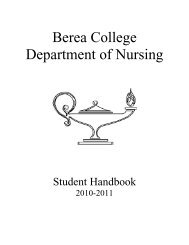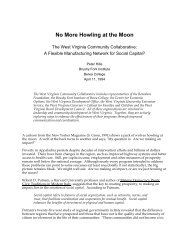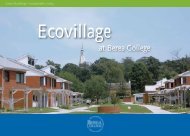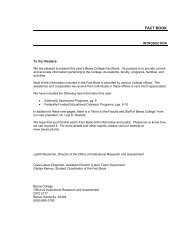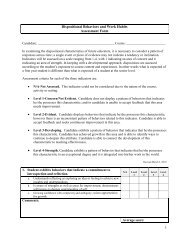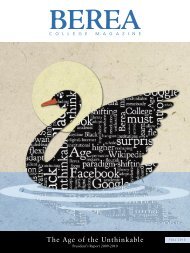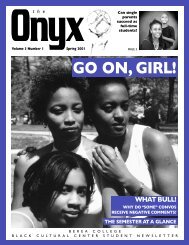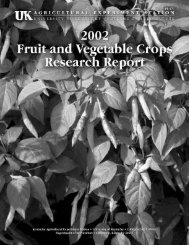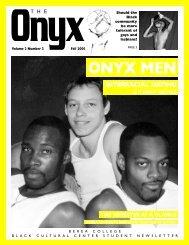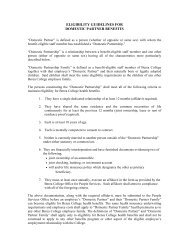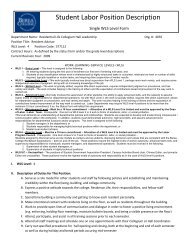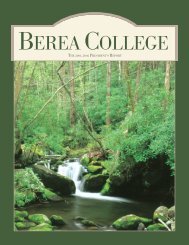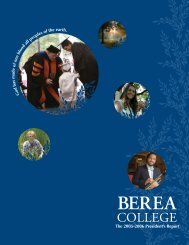Spring 2004 Issue - Berea College
Spring 2004 Issue - Berea College
Spring 2004 Issue - Berea College
You also want an ePaper? Increase the reach of your titles
YUMPU automatically turns print PDFs into web optimized ePapers that Google loves.
MISSION<br />
✼✽✪✽✮✶✮✷✽<br />
The Black Cultural Center first opened its doors in July<br />
1983.The Center was established and based on the premise<br />
that true integration and equality cannot be achieved without<br />
a general awareness and understanding of black culture.The<br />
Black Cultural Center provides programs and services that<br />
foster cross-cultural exchanges and intentional social<br />
intercourse.<br />
The mission of the Black Cultural Center is to:<br />
• assist <strong>Berea</strong> <strong>College</strong> in maintaining an environment that<br />
acknowledges, respects, and enhances diversity and<br />
promotes multicultural educational opportunities;<br />
• assist the <strong>College</strong> in its effort to recruit, retain, and<br />
graduate students of color;<br />
• assist students of color in developing a greater<br />
understanding of his/her own culture and heritage<br />
• provide support services, programs, and activities that<br />
promote the intellectual, career, social, moral, and<br />
personal development of students of color and assist<br />
them in achieving their highest educational potential; and<br />
• assist <strong>Berea</strong> <strong>College</strong> in recruiting and retaining faculty of<br />
color.<br />
ANCESTOR<br />
✱✲✰✱✵✲✰✱✽<br />
Chinua Achebe<br />
Achebe is a writer, teacher, editor and diplomat.<br />
He published his first novel Things Fall Apart, two<br />
years before the British left Nigeria.This novel is a<br />
landmark: it is printed in 40 different<br />
languages and has sold millions of<br />
copies across the world.After college<br />
and teaching for a year,Achebe spent<br />
twelve years as a television producer.<br />
He discovered that almost all books<br />
about blacks were written by white<br />
Achebe<br />
people and that encouraged him to write. He felt<br />
that no white man could get under the skin of a<br />
black man like a black man. Chinua Achebe was<br />
offered the presidency of his home country of<br />
Nigeria, but refused. His works are unbelievable<br />
in insight of language and place has had a great<br />
impact on many.<br />
—AAWC<br />
Identity<br />
Continued from p. 2<br />
When confronted with such questions, there are those who<br />
have a difficult time describing the African component of their<br />
identity. The American component has been much easier to<br />
characterize because of the lifestyle, history and culture<br />
assimilated over the years from mainstream society.<br />
Unfortunately, there is a loss of consciousness within the<br />
Black community in America, for much less is known about<br />
being African than American. How does Black America then<br />
recover from this loss? During the Short-term of <strong>2004</strong>, I was<br />
blessed with an opportunity to travel to Ghana, West Africa<br />
with a class entitled Reclaiming Wisdom through Music, Religion<br />
and Philosophy, where I served as an administrator. As the title<br />
of the class implies, we all had a unique opportunity to discover<br />
a portion of African music, religion and way of life through<br />
dialogues, readings and experiential learning. Among the<br />
people, I felt the intense pride of their birthrights; listening to<br />
the rhythm of the drums, I heard the legacy of their forefathers;<br />
and at the shores of the slave dungeons, I experienced an<br />
awakening in the cradle of my heritage. It was there that I<br />
realized more than ever who I am. It was there that I<br />
confirmed my self-awareness as an African American.<br />
Through the middle passage to slavery, Africa is a part of all<br />
Americans’ history and should be integrated into each of our<br />
lives, particularly those of African descent. The encounters I<br />
had in Ghana was nothing short of a profound spiritual,<br />
cultural and African connection filled with honored tradition<br />
and proud heritage. What was lost, found; what was once<br />
removed, now reclaimed.<br />
Jonathan L. Johnson is a member of the Residential Life Collegium<br />
at <strong>Berea</strong> <strong>College</strong>.



